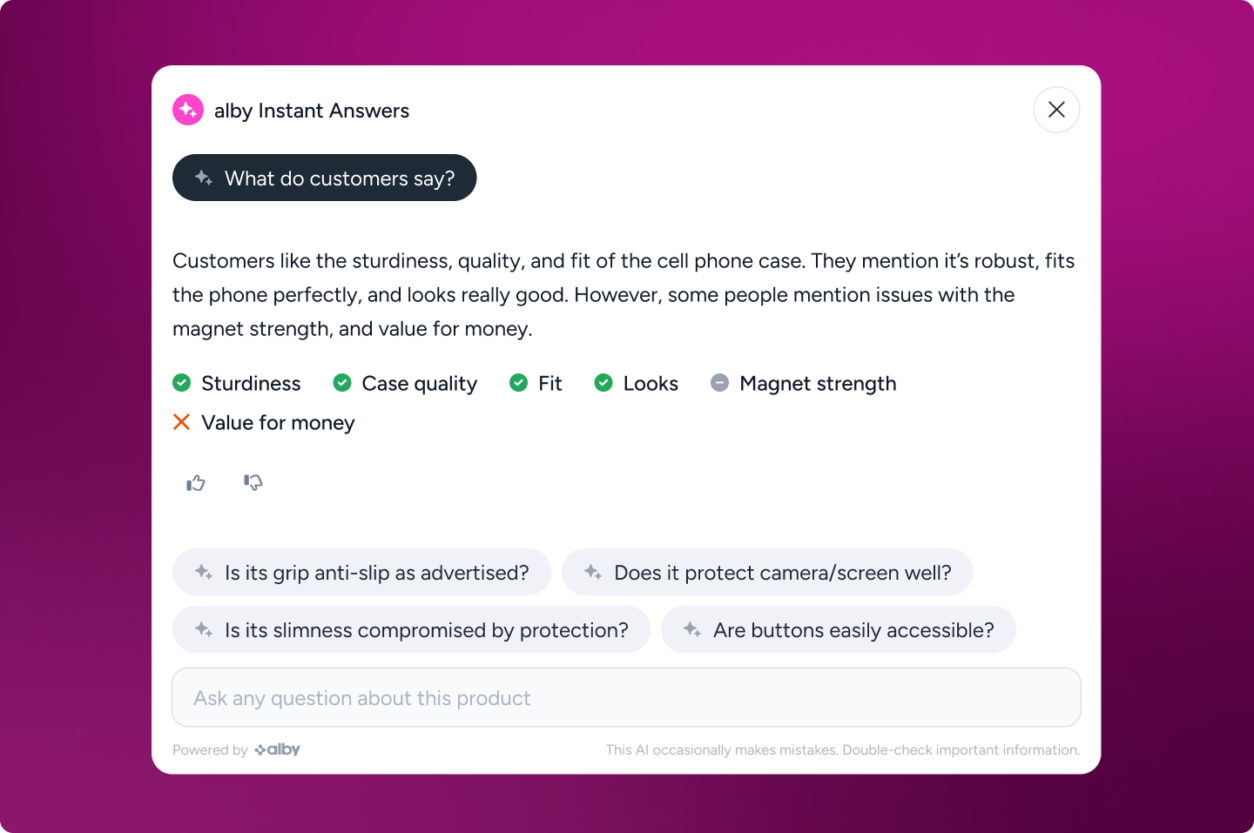Choosing an AI Shopping Agent: The Retailer’s Guide to Elevating Customer Experience and Driving Conversions with Gen AI

Every retailer is looking to Generative AI to solve their most thorny business challenges: creating seamless customer experiences, driving conversions, and personalizing at scale. But with shifting customer expectations and jam-packed product roadmaps, it’s hard to know which solutions will deliver value and which will waste valuable resources.
Enter the AI shopping agent: The key to effortless shopping.
By mimicking the personalized, hands-on experience of an in-store salesperson, an AI shopping agent can help shoppers find the right products faster and drive more purchases in the process. This emerging technology, powered by the latest large language models, predicts customer needs, anticipates their next steps, and guides them toward the right product in a way that feels personal and effortless.
Amazon’s rollout of their early-to-market Rufus feature is already shaping customer expectations for online shopping. As consumers grow accustomed to AI-driven, conversational solutions on the world’s largest online retailer, they’ll soon expect the same seamless experience from other retailers.
The question is: Will your brand lead the way?
The Benefits of AI Shopping Agents
Every customer arrives at your website with a goal — whether it’s exploring options, comparing products, or making a purchase. But too often, they’re met with friction, forced to hunt down the information they’re looking for.
AI shopping agents remove that friction by anticipating needs and guiding shoppers seamlessly.
- They drive engagement. alby data shows that 95% interact with the pre-populated prompts, rather than typing their own questions. By surfacing relevant recommendations, product details, and timely nudges, AI shopping agents keep shoppers moving toward checkout.
- They improve customer satisfaction and loyalty. A seamless experience builds trust. By eliminating guesswork, AI shopping agents help customers find exactly what they need — leading to high customer satisfaction scores and repeat purchases.
- They turn intent into revenue. AI shopping agents boost conversions by anticipating needs, offering tailored recommendations, and helping shoppers make confident decisions in real time.
The result? Less friction, happier customers, and measurable business impact.
Build versus buy: the best path to your AI solution
For many retailers, the question of building AI solutions in-house versus investing in a proven platform is a critical decision. On the surface, building an in-house AI platform may seem like the ultimate way to control costs and customize features. But the reality often proves more complex — and more costly.
- In-house AI comes with hidden challenges: Scaling an AI experience demands robust engineering resources, data infrastructure, and constant maintenance. And that’s just building the models, without factoring in the software needed for marketing and merchandising teams to manage their brand voice and develop guard rails. From training machine learning models to managing integrations across customer touchpoints, the effort required to keep up with rapidly evolving customer expectations can quickly outpace even the best in-house teams.
- Ready-made platforms deliver cutting-edge capabilities: By choosing a ready-made AI shopping agent, retailers gain access to cutting-edge capabilities without the heavy upfront investment or operational burden. These solutions are designed to scale effortlessly, adapt to market shifts, and integrate seamlessly with existing systems, allowing your teams to focus on what matters most: delivering world class customer experiences and driving revenue growth.
- AI shopping agents amplify your team’s impact: They typically require minimal developer lift to implement and manage. With seamless integration and intuitive management tools, your teams can hit the ground running without adding unnecessary complexity, allowing you to redirect tech resources to growth and innovation.

Ultimately, the decision comes down to priorities. Do you want to spend time and resources building from scratch? Or would you rather focus on high-value work, like crafting campaigns, optimizing products, and testing new growth strategies?
How to choose the right AI shopping agent for your business
The right AI shopping agent delivers measurable outcomes, works seamlessly with your teams, and evolves with your business. To make sure you get the optimal AI shopping agent, here’s a guide to evaluating providers.
Balance business outcomes with customer experience
It’s easy to get lost in the technical features of an AI solution. But to truly unlock growth, it’s more important to focus on outcomes.
AI shopping agents are still new, and success will come from balance — driving measurable business impact, such as higher conversions and larger basket sizes — while creating a frictionless experience that keeps customers engaged.
Shoppers are already growing accustomed to AI-powered assistance, but not all features deliver bottom-line value. To make the most of this technology, retailers need a clear read on what’s impactful and what’s noise.
Start by identifying what success looks like for your business in the near- and long-term. Then, align your provider evaluation to make sure their AI shopping agent can deliver.
Key Questions to Ask:
- In addition to metrics, what kind of shopper insights can be pulled?
- Can you demonstrate specific results around CX — like engagement rate and CSAT scores?
- Can you demonstrate specific business results — like conversion lift, AOV increases, or revenue per session?
- How does your platform handle A/B testing during a pilot period and at scale?
Be ready to talk anywhere at any time
The online shopping experience is often fragmented — and that’s totally fine. Shoppers browse on their phones before an email jogs their memory and they convert onsite. Since they seamlessly navigate between channels, the AI shopping agent should be present on all of them.
Key Questions to Ask:
- Are conversational capabilities available in mobile apps?
- Are there conversational elements that can be displayed in email that link back to the site or deep link to the app?
- How can we apply this to our SMS/MMS program so that we’re launching two-way communication in that channel?
Make sure the AI shopping agent can address diverse shopper needs
A strong AI shopping agent should go beyond generic prompts, understanding which questions actually drive shoppers to convert. The ability to handle a wide variety of queries — from product comparisons to outfit suggestions or review summaries — is what transforms the shopping experience into a personalized journey.

Key Questions to Ask:
- How does your AI shopping agent predict customer questions in real time?
- What types of shopper questions can the AI shopping agent answer?
- Does the platform include specialized capabilities, such as visual matching, product recommendations, or review summaries?
- Can the AI shopping agent support customizations to align with our brand’s unique needs and create a bespoke experience?
- How easily can new capabilities or “skills” be added as customer needs evolve?
Understand your data needs
Large language models work off the data you put in. The power of these models comes from synthesizing large amounts of structured and unstructured data in order to provide meaningful answers to your shoppers’ questions.
Key Questions to Ask:
- What are the data needs for your AI shopping agent, and how easy is ingestion?
- Can your AI shopping agent ingest large amounts of supplemental data: customer reviews, community Q&A, company policies, etc.?
- What point-and-click integrations are available to feed your AI shopping agent more information?
Make sure it’s easy to implement and manage
The right AI shopping agent should empower your teams — not burden your engineers. Look for a solution that’s easy to set up, requires minimal technical work to manage, and allows business stakeholders to tune performance without heavy lifting.
Key Questions to Ask:
- How much technical work is involved in implementation? Can the system integrate with my existing tools?
- How do non-technical teams provide feedback, refine prompts, or customize outputs?
- How much ongoing management or QA is required from teams?
- Does the platform provide clear documentation and support to simplify onboarding for both technical and non-technical teams?
- How can merchants and marketers access insights to better inform product and campaign planning?
Prioritize transparency for your team and shoppers
The right AI shopping agent provider should act as a true partner, offering clear insight into how their models work and how you can guide and control their responses. Transparency empowers your teams to trust and optimize the solution.
But it’s not just about internal visibility — transparency also matters for your shoppers. With AI technology still novel, customers need assurance that their data is handled securely and ethically. Data protection should be a top priority, with robust safeguards in place to build trust and maintain credibility. AI solutions should also provide clear governance to support privacy, fairness, and unbiased recommendations.
Key Questions to Ask:
- How do you prevent your AI shopping agent from sharing false or inappropriate information?
- How do you handle ‘hallucinations’ from the AI model?
- Can my team easily add custom guardrails to guide output?
- Can we customize the AI shopping agent’s tone, messaging, and priorities to align with our brand?
- Do you provide tools for monitoring and flagging conversations that require further refinement?
Think about flexibility for long-term growth
An AI shopping agent is a growth engine that should evolve with your business. Make sure your provider has a strong roadmap for innovation.
Ultimately, no one knows your customers better than your team. The right AI solution shouldn’t replace that expertise; it should enhance it.
Think of AI shopping agents as a foundation, not a fixed system. The most effective platforms give your team the flexibility to refine, expand, and build on top of existing capabilities, ensuring your AI strategy evolves alongside your business and customer needs.
Key Questions to Ask:
- How do you plan to evolve your AI shopping agent capabilities over the next 12 months?
- Can the platform scale to support more products, languages, or markets as our business grows?
- Are you LLM-agnostic? Can we bring our own AI models or easily swap between providers like OpenAI or Google?
- How can data scientists and engineers access raw data to train their own models?
- Is your platform ‘developer-friendly’? Are we able to build on top of out-of-box capabilities?


